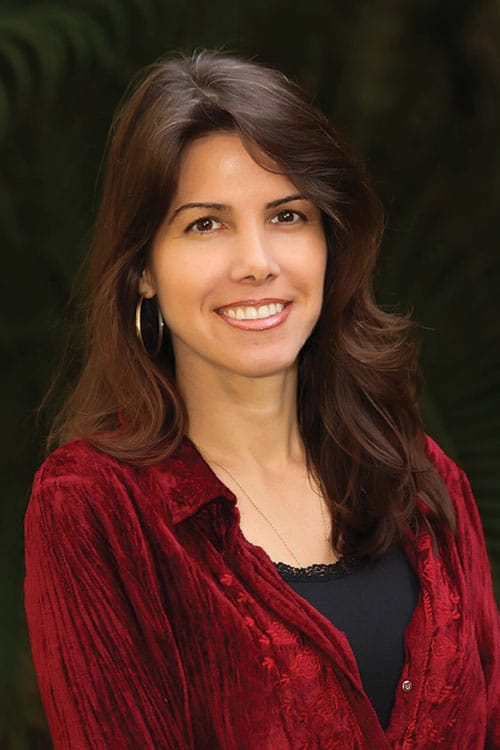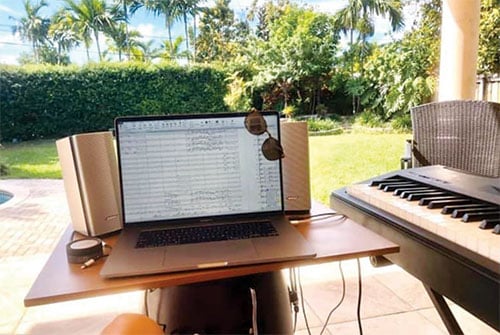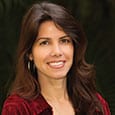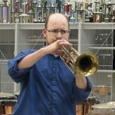
An Interview with Michele Fernández
Michele Fernández has been on fire since becoming a full-time composer a few years ago. Her symphonic and jazz compositions were performed by five groups at the 2023 Midwest Clinic. She has published works with several companies as well as some through her own MF Music. She directed middle school and high school bands in Miami, Florida, for 30 years. Her Miami Senior High School groups were twice invited to perform at Midwest. She is active as a clinician and conductor for all-state and regional honor groups.
How did you get started in music?
I did not intend to be a band director. It was my goal to be a trial attorney. I went to University of Florida on an oboe scholarship and majored in music education and took law school prep classes on the side. I intended to apply to law school and even took the LSAT. Getting into the band directing world was a beautiful accident. In the spring of my senior year, right before spring break, the phone rang. I was vacuuming my room and didn’t even turn it off to pick up the phone.
It was my high school principal, Mr. Garcia, and the high school activities director was in the room with him. They said that my old director was leaving to become an assistant principal somewhere else, and they wanted somebody home grown to keep the program going as it was. I was the drum major, in high school, so they were familiar with me as a student. I decided to try it for a year. If I didn’t like it, the worst that would happen would be that I would get some life experience and money to help my family. Thirty years went by, and if I had to make the same decision again, I would. Interestingly, if you open up my high school yearbook, right next to that principal’s name he signed “Michele – you have been a bright spot at Miami Senior High School. When you are ready for a job, see me.”
What do you remember from your own high school years?
I have generally fond memories of my high school years; our band program was very involved in performing for the community. Our band room generally had a cooperative and familial atmosphere, and the band director, Victor Lopez, worked hard and inspired many of us to continue in music in some form. Interestingly, during late spring of my junior year in 1984, I was doing math homework in the band room and was doodling notes in the upper-right-hand corner of the page when he walked by and noticed my manuscript handwriting. He had recently started arranging for Warner Brothers if memory serves, and had arranged a few stand tunes for our marching band. He offered me $2 per page to hand-copy the parts off the score. Being a high-school kid, I just wanted money to gas up my car, so I accepted the gig. As far as I knew, I was headed to law school someday.
Although I never really analyzed the scores as I copied the parts back then, through osmosis I did learn some general things about navigating a score, and transposition. I went on to college to play oboe in symphonic groups as well as some piano in the jazz bands before unexpectedly returning to teach band at my old high school. By the time I took my first teaching job, I became interested in arranging some of our own stand tunes, especially since my college director at UF also arranged our marching band music. Thirty years later, although my writing does not emulate anyone’s style and has its own voice (especially in my approach to writing for the rhythm section), I can definitely say that seeing my own directors arranging for the band made it feel more “normal” to just slip into that role when it was my turn to teach.
When you spoke about your music at a Midwest concert last year, I was touched by how stories from your personal life come across in your music. How did that approach affect your decision to compose full time?
My family’s personal story has a lot to do with my choice to retire from teaching. I reached my 30 years requirement to retire with Dade County right around the time when COVID happened. Over the years, I had written pieces that my students had performed, including a couple of pieces at the Midwest Clinic back in the 1990s. I always kept that interest in writing.
When the Hillgrove High School Jazz Band from Powder Springs, Georgia, was invited to perform at the Midwest in 2023, they chose a piece entitled Iluminada, which I had written for my daughter, Sara. Incidentally, Sara recently graduated with her Masters degree and is now a new music teacher as well as a very capable performing flutist (she actually recorded the flute solo for the Hal Leonard release of this same publication).
The story behind this piece is especially poignant, as I had written it to thank her for talking me into going back to music after our three-year-old son Sean (her brother) passed away in 2002 due to a series of very serious medical mistakes. We had lived in the hospital for a year.
After that happened, I did not want to go back to teaching band at all. The last thing on my mind was deciding if somebody was in tune or not, so I started teaching special education and some other subjects. Four years later, when my daughter was 6, her K-8 principal tried to recruit me to teach band. I politely said “no” several times. One evening I was reading her a book when she sat up and said, “Mom, the principal stopped me in the hallway today and said you were going to be the band director.” She seemed excited, but I told her I wasn’t interested. She lowered my book gently and said, “Wait a minute. We go through a lot, right? And music made you happy, right? I said yeah. Then she said, “So what’s your problem?”
That hit me like a 2×4 to the head. Here was a six-year-old telling me to get back to what made me feel exhilarated. The next day I jumped in the car and drove over to the school. The principal smiled when he saw me at the door of the office and called me. That was it.
I approached teaching from a different perspective after that. I borrowed my husband’s truck, purchased a foosball table from Craigslist, a mini air hockey table, and a mini pool table. I set up bean bags in the corner of the room. I tried to create as much of a family atmosphere as I could. I used to go around school and look for kids sitting in the hallway by themselves. I would sit down on the floor next to them and invite them to join band. I got their ID numbers and went to the counselors to switch their schedules.
I turned the band room into a home where every student would feel comfortable. I reminded students to avoid hurting people’s feelings and to invite others to the foosball table. I had a rule that you could not use the foosball table unless there was someone from each grade level there. You would see upperclassmen calling over the brand new kid sitting alone. Before you knew it, the older kids were high-fiving the younger ones.
One reason why people respond to your music is because of the emotion that you write with and your willingness to let people in. Have you always been comfortable talking about your life and how it impacts your music?
Yes, absolutely. I find it difficult to sit down and start to write just because somebody says we need a grade 2 work. Often, it is a memory or a meaningful experience that triggers a new composition. Once I have the inspiration, my family might have to slip food under the door for the next few weeks. Sometimes, I have had 12-hour sessions where I can’t tear myself away. When I start writing, I’m not too worried about the mechanics. I’m just feeling the catharsis, and later I come back and make it work mechanically.

Fernández’s Composing Setup at home
When you are writing, are there specific goals or ideals in your mind?
Because my music is based on emotions, I start with the excitement of getting a feeling out. With much of the music I write, I picture something. I just finished a jazz chart called The Pursuit of Funkiness. It came to me while I was driving around and hearing people honking. It recreates sirens and being chased by the police. It’s a fun chart that tells a story. I don’t intend to tell a story. I envision a story, and it spills out that way. Later, I work on the technical aspects. I might adjust the ranges to fit a grade 3 or water something down to make it more accessible, perhaps simplifying a 16th note run in a way that keeps the same idea. If I allow emotions to rule me, I might end up in a marathon writing session. I have composed for as long as 14 hours with my spine hurting and ignoring the pain. This is not a good idea.
When I wrote the piece Of Endless Miles and Empty Rafts for Braswell High School Wind Symphony to perform at Midwest last year, the music came as a movie playing in my mind while I was playing and writing it. Director Aaron Snipes III asked me to write something that deeply connected with me, and I instantly thought of when I was a little girl growing up here in Miami in the 80s. Back then we would hear about another raft washing up on the shore empty. As I child I wondered who was in that raft, what did they go through, and where were they now?
As I wrote the opening chorale, I pictured a family in a raft being tossed about by the heavy seas in the dark. The rain is beating down, and cymbal crashes represent waves smashing against the side of the raft. The big climactic part is someone falling overboard and sinking down into the water. Then, it seems almost like a wave washes over and there is a flashback to that person’s dignified, gentle life at home.
I don’t realize any of this when I am writing. I see the movie in my mind, think about what is happening, and capture the melody coming into my head. Later, when I come back, the music sounds like the movie. Students really received the story well. The couple of times I’ve done clinics on this work, students have written me letters or walked up in person to tell me about stories from their family and friends. They all can relate to someone in the family leaving home for some reason.
I remember getting an email from a young lady in Minnesota who told me that there were only a few kids from different places in her town, but now she wanted to know more about their history. She felt more comfortable asking about their families and their stories. The letter brought tears to my eyes because that is what I was praying for. This piece isn’t a political statement; it’s about having empathy for anyone who’s had to leave home to protect their family.
How do you incorporate elements of your culture into your music?
There are some fantastic works out there with hybrid elements of various musical styles that are incredibly interesting to me. However, if we call a piece a mambo or a bolero, I want students to learn the authentic pattern. I just finished a 3/4 Spanish march that I promised my father I would write 32 years ago when I was a young band director. His mother was a flamenco dancer in Asturias, Spain who died when he was only 6. My dad remembered all the details from watching his mom dance, the dress and the castanets, and these memories made him tear up.
I didn’t know how to write for symphonic band back when I was 24, so it really felt good to start the piece last month. I just finished it and called it La Fiera Asturiana because she fought to stay and raise her three little kids but didn’t make it. I am so proud of my Spanish heritage and love to share it. I recently finished another work entitled, Embers of the Ancient Realms because I am fascinated by Middle Eastern music and the historical aspects of African rhythms and Middle Eastern forms. All of these elements came together to create an intense tapestry in this work.
What was music like at home when you were growing up?
When I was in high school, I was the one who painted AC/DC and Van Halen logos with shadowing on my folder. When my dad was waiting in the car for me, he listened to salsa on the radio. As soon as he saw me coming down the driveway, he turned it off because he knew I had my Van Halen cassette in my hand. My tastes obviously broadened as I went through college.
My musical interests broadened after graduating from college and taking the job at Miami. A friend asked me to play piano in a very busy salsa band that gigged all over town. I said I didn’t know how to play that stuff, and my friend told me not to worry because the bass player also played piano and would show me what to do. I stayed with the band for the next ten years and learned it all. During breaks, I went up to everyone and asked questions about what they were doing. My interest in the music took off, and it was no longer the music of the old country. I felt it in my blood, and it was burning the whole time. I really treasure it.
Who are some of your favorite musicians and composers?
I have a wide taste in music. When I’m making dinner, I listen to Earth, Wind & Fire, or Blood, Sweat & Tears. My favorite Classical piece of all time is Barber’s Adagio for Strings. I also find the music of Brahms just intensely moving. Debussy is also a heartfelt favorite. However, now that I am writing for so many hours a day since retirement from teaching, I might not listen to music at all during my free hours, just to clear my head.
What advice do you have for directors?
I encourage directors to help kids tell a story when playing. Read them the program notes and ask what they picture happening at various parts of the music. If there are no program notes, ask them what kind of movie scene they would write for any given section. They will raise their hands and share different ideas. This often sparks very interesting conversations and the kids do enjoy sharing their movie scenes. That approach gets them involved emotionally and also puts them in a movie in their minds, so that they will play the music with more emotional feel. The other advice I have is to choose music that is challenging enough to help them progress, but not so much that you are chasing notes until the last minute. Over the years, I found that kids have the most fun when add nuance, discussing storylines and expression, not fixing wrong notes.
Lastly, try to write an (easy) arrangement of a favorite pop tune for a concert each semester. Why not? You don’t have to major in composition to be able to write something that the audience and the kids will enjoy. I should know; I never majored in composition, either.

2022 Midwest Clinic premiere of “La Luz En Ti” (Hal Leonard), University of North Texas Two O’Clock Lab Band
“I love to talk about life lessons with the kids and give them something they can take away. At Tennessee All-State, we played six charts, and all were demo recording quality. We finished early, and I asked the players to put the chairs in a circle for the last hour before the evening rehearsal. We ended up talking about life. I asked them about their fears and hopes about continuing in music. I asked how music affected them or helped them overcome anything difficult in their lives. I could not believe how much these students opened up. It turned into a long talk that lasted for over an hour, past their release time for the evening. None of the kids wanted to leave. They were sharing life advice and reassuring each other. I stepped back and just let them take over. It was beautiful.”






